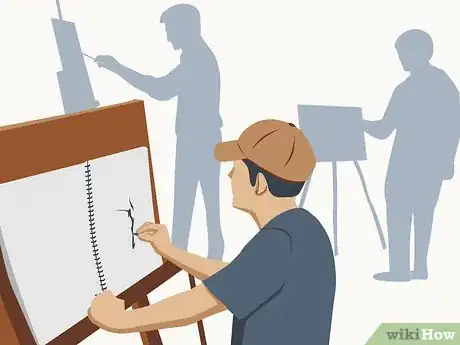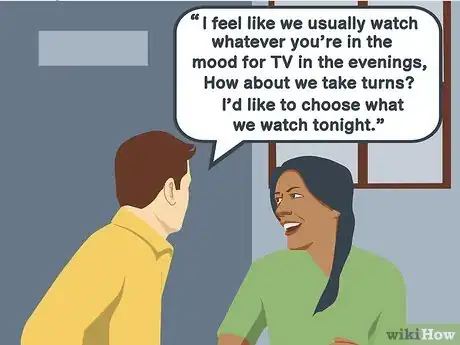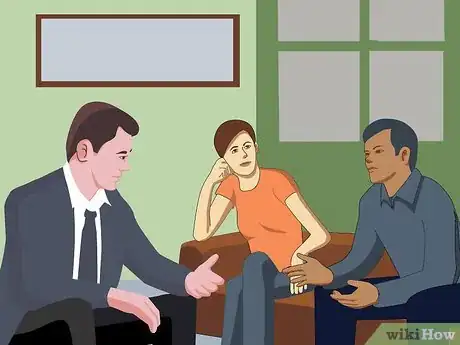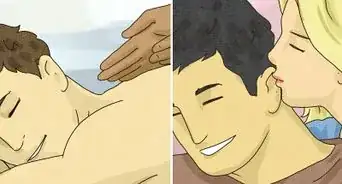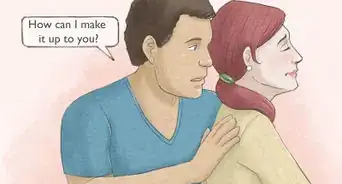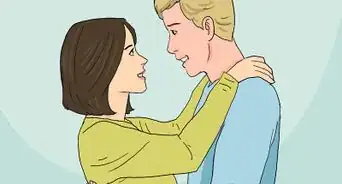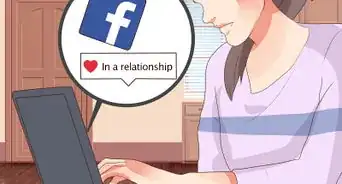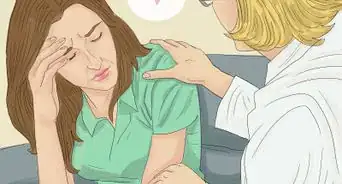This article was co-authored by Moshe Ratson, MFT, PCC and by wikiHow staff writer, Megaera Lorenz, PhD. Moshe Ratson is the Executive Director of spiral2grow Marriage & Family Therapy, a coaching and therapy clinic in New York City. Moshe is an International Coach Federation accredited Professional Certified Coach (PCC). He received his MS in Marriage and Family Therapy from Iona College. Moshe is a clinical member of the American Association of Marriage and Family Therapy (AAMFT), and a member of the International Coach Federation (ICF).
This article has been viewed 10,259 times.
When you’re in love, it’s easy to feel like your partner is your whole world. However, if you let your relationship consume you too much, you might start to lose your sense of self and feel like you’re not a complete person without your partner. If you spend most of your time thinking about your relationship, you consistently put your partner’s needs and interests first, or you’re not really sure who you are anymore, you might be losing yourself in your relationship. Luckily, once you recognize the signs, there are things you can do to regain your sense of self and become the real you again.
Steps
Spotting Signs of Self-Loss
-
1Note if you spend most of your time thinking about your relationship. It’s normal to spend a lot of time thinking about your partner and your relationship, especially when the relationship is new. However, if you find yourself thinking about your relationship most of the time—to the point that you have a hard time thinking about anything else—then you might be losing yourself in your relationship. Pay attention to your thoughts throughout the day and ask yourself if you seem preoccupied by your relationship.[1]
- For example, you might find yourself obsessing or worrying about your relationship when you’re trying to work, sleep, or pay attention in class.
Tip: In a codependent relationship, you might even change the way you think about your own identity so it’s more focused on your partner. For example, you may go from thinking of yourself as “Bertie” to thinking of yourself as “Madeline’s husband.”[2]
-
2Ask yourself if you are always seeking reassurance from your partner. When you lose yourself in a relationship, you can start to feel like your happiness and sense of self-worth depend entirely on your partner. Think about whether you constantly feel like you need reassurance that they love you and care about you.[3]
- For example, you might say things to your partner like, “Do you really love me?” or “You won’t leave me, will you?”
Advertisement -
3Check if you’re neglecting your other relationships. Think about how your relationships with your friends and family may have changed since you got together with your partner. Do you still spend time with them? If so, do you ever have one-on-one time with them, or is your partner always there?[4]
- Your friends and family may comment or complain about how little they see of you.
- You might find yourself making excuses not to spend time with other people you care about, even if you miss them or feel lonely.
-
4Watch for a loss of interest in your own goals, hobbies, and dreams. Consider whether you still spend time doing things that you enjoy and care about. If you’re losing yourself in a relationship, you might spend less and less time pursuing your own interests in order to focus on things that your partner enjoys or cares about.[5]
- For example, if you enjoy hiking, but your partner isn’t interested in it, you might give up on hiking in order to spend time watching their favorite sports with them.
- You may find yourself sacrificing your own goals in order to support your partners’.
- You might get so caught up in your partner’s interests that you’re not even sure what you like or care about anymore.
-
5Pay attention to whether you feel uncomfortable when you’re alone. When you’re comfortable in your own identity, you’ll probably enjoy being alone from time to time. If you get too caught up on a relationship, however, you might feel uncomfortable, unsure of yourself, or “incomplete” whenever you’re away from your partner.[6] Consider whether you’re able to spend time by yourself without feeling lost or preoccupied with what your partner is doing.
- For example, you may feel the need to check in with your partner frequently, or you might even worry about what they would think of what you’re doing when they’re not there.
- It’s normal to miss your partner and feel lonely when you’re apart for a while, but comfortable alone-time is also an important part of a healthy relationship.
-
6Keep an eye out for approval-seeking behaviors. Think about whether you do most things because you want to do them, or because you think your partner will be pleased. You might also avoid doing things you’d otherwise do because you’re afraid they might not approve. When you lose yourself in a relationship, you become focused on keeping your partner happy to the point where it might impact your own wellbeing.[7]
- For instance, you might change the way you dress or get a haircut you don’t really like just because you think your partner will like it.
-
7See if you put your partner’s needs before your own. Ask yourself if you regularly make sacrifices for your partner, especially if they seldom make sacrifices for you in return. If you find yourself constantly putting their happiness and wellbeing before your own, this is a sign that you’re losing yourself.[8]
- For example, you might agree to move someplace far from your family or leave a job you love just to please your partner, even if it makes you unhappy.
- While some sacrifice is normal and healthy in a relationship, it’s important to be able to compromise and take the needs of both partners into account.
-
8Look for signs that you idealize your partner. There’s nothing wrong with thinking your partner is awesome—that’s why you fell in love with them, after all—but putting your partner on a pedestal can be a sign that you’re in an unhealthy, codependent relationship. Consider whether you think of your partner as “the one” or feel like you couldn’t possibly be happy without them.[9]
- You might regularly dismiss your partner’s flaws or make excuses for them when they behave poorly.
Repairing Your Sense of Self
-
1Set healthy boundaries with your partner. Setting boundaries is an important step to making your relationship healthier and feeling like your own person again.[10] Think carefully about your needs, values, and expectations from your relationship, as well as what behaviors you’re uncomfortable with from your partner. Once you’ve figured out what your boundaries are, spell them out clearly to your partner.[11]
- For example, you might say, “I really need to spend quality time with Sarah sometimes. Please don’t keep calling to check in with me while I’m out with her unless something really important comes up.”
- Sometimes setting a boundary can be as simple as saying “no” when you don’t want to do something.
-
2Schedule time with your friends and family. Maintaining your other relationships is vital to your emotional health and your sense of identity. While it’s great to spend quality time with your partner, it shouldn’t come at the cost of seeing the other people in your life who are important to you. Set aside a little time each week for other people you love, even if you only have time for a quick phone call.[12]
- It’s healthy to spend time together with your partner and your friends and family, but it’s also important to have social time without your partner present.
Warning: Your partner should never try to interfere with your other relationships or keep you isolated from your friends or family. This is a major warning sign of an abusive relationship.[13]
-
3Spend time alone on a regular basis. Being by yourself can help you feel more confident and independent. It’s also a good way to start reconnecting with your own identity. Set aside a little time by yourself as often as possible, even if it’s just half an hour every evening.[14]
- Take advantage of your alone time to relax, contemplate, or do things you enjoy. For example, you might write in a journal, work on an art project, go for a walk, meditate, or watch an episode of your favorite show.
-
4Make a list of your own interests and values. When you’re too wrapped up in a romantic relationship, you can start to forget what you actually care about. Take time to reconnect with your own interests and values.[15] Think about things that you enjoyed doing or felt passionate about before your relationship, and write them down.[16]
- For example, you might remember that before you met your partner, you were really into drawing or reading graphic novels.
- Think about whether you might have sacrificed or changed any of your core values or beliefs to suit your partner. Ask yourself if you really agree with your partner’s opinions, or if you’ve just been going along with them to make them happy.
-
5Work on your own goals and hobbies. Doing things you enjoy and care about can help you maintain your sense of identity separate from your partner. While it’s good to support your partner and try to connect with their interests, make sure you also set aside time for the things that are important to you.[17]
- For example, you might sign up for a class on a topic you’re interested in or join a club for people who share your hobby.
- Try inviting your partner to join you sometimes—you might discover that they’re more interested in the things you care about than you thought! However, it’s also important to be able to enjoy your interests on your own.
-
6Tell your partner what you want. Your partner may not realize that you feel like you’re losing yourself in the relationship. Make an effort to communicate with them about how you feel, even if it’s difficult at first.[18] Let them know what you need and want out of the relationship, and how they can help meet your needs.[19]
- For example, you might say, “I feel like we usually watch whatever you’re in the mood for on TV in the evenings. How about we take turns? I’d like to choose what we watch tonight.”
- Use “I” language so that you don’t sound accusatory. Your partner will be more likely to hear your side of things if they’re not feeling defensive. For example, instead of saying things like, “You always do whatever you want!” try something like, “I feel frustrated and out of the loop when you make big financial decisions without discussing them with me.”
-
7Get couples counseling if your partner is willing. If you’re in a seriously imbalanced relationship and are struggling to regain your sense of identity, counseling can be a big help. Ask your doctor to recommend a therapist who works with relationship issues, or do a search online for well-reviewed couples counselors in your area.[20]
- A therapist can act as an objective third party and help put the issues with your relationship into perspective. They can also help give you and your partner advice about how to make the relationship healthier and more balanced.
- Seek therapy on your own if your partner won’t go with you, or even as a supplement to couples counseling. Individual therapy can also help you cope with your situation and learn how to reconnect with your own identity.
Expert Q&A
-
QuestionHow do I find myself after losing myself in a relationship?
 Moshe Ratson, MFT, PCCMoshe Ratson is the Executive Director of spiral2grow Marriage & Family Therapy, a coaching and therapy clinic in New York City. Moshe is an International Coach Federation accredited Professional Certified Coach (PCC). He received his MS in Marriage and Family Therapy from Iona College. Moshe is a clinical member of the American Association of Marriage and Family Therapy (AAMFT), and a member of the International Coach Federation (ICF).
Moshe Ratson, MFT, PCCMoshe Ratson is the Executive Director of spiral2grow Marriage & Family Therapy, a coaching and therapy clinic in New York City. Moshe is an International Coach Federation accredited Professional Certified Coach (PCC). He received his MS in Marriage and Family Therapy from Iona College. Moshe is a clinical member of the American Association of Marriage and Family Therapy (AAMFT), and a member of the International Coach Federation (ICF).
Marriage & Family Therapist Make a list of the things you need and value in your life so you know what to look for moving forward.
Make a list of the things you need and value in your life so you know what to look for moving forward. -
QuestionHow do I stop losing myself in a relationship?
 Moshe Ratson, MFT, PCCMoshe Ratson is the Executive Director of spiral2grow Marriage & Family Therapy, a coaching and therapy clinic in New York City. Moshe is an International Coach Federation accredited Professional Certified Coach (PCC). He received his MS in Marriage and Family Therapy from Iona College. Moshe is a clinical member of the American Association of Marriage and Family Therapy (AAMFT), and a member of the International Coach Federation (ICF).
Moshe Ratson, MFT, PCCMoshe Ratson is the Executive Director of spiral2grow Marriage & Family Therapy, a coaching and therapy clinic in New York City. Moshe is an International Coach Federation accredited Professional Certified Coach (PCC). He received his MS in Marriage and Family Therapy from Iona College. Moshe is a clinical member of the American Association of Marriage and Family Therapy (AAMFT), and a member of the International Coach Federation (ICF).
Marriage & Family Therapist Set some personal boundaries for yourself so you're less likely to get used or manipulated.
Set some personal boundaries for yourself so you're less likely to get used or manipulated.
References
- ↑ https://time.com/5349927/codependent-relationship-signs/
- ↑ https://blogs.psychcentral.com/imperfect/2017/01/how-to-maintain-your-sense-of-self-in-relationships/
- ↑ https://time.com/5349927/codependent-relationship-signs/
- ↑ https://blogs.psychcentral.com/imperfect/2017/01/how-to-maintain-your-sense-of-self-in-relationships/
- ↑ https://blogs.psychcentral.com/imperfect/2017/01/how-to-maintain-your-sense-of-self-in-relationships/
- ↑ https://time.com/5349927/codependent-relationship-signs/
- ↑ https://blogs.psychcentral.com/imperfect/2017/01/how-to-maintain-your-sense-of-self-in-relationships/
- ↑ https://greatergood.berkeley.edu/article/item/when_are_you_sacrificing_too_much_in_your_relationship
- ↑ https://time.com/5349927/codependent-relationship-signs/
- ↑ Moshe Ratson, MFT, PCC. Marriage & Family Therapist. Expert Interview. 7 August 2019.
- ↑ https://psychcentral.com/blog/why-healthy-relationships-always-have-boundaries-how-to-set-boundaries-in-yours/
- ↑ https://blogs.psychcentral.com/imperfect/2017/01/how-to-maintain-your-sense-of-self-in-relationships/
- ↑ https://www.breakthecycle.org/blog/warning-signs-spotlight-isolation
- ↑ https://blogs.psychcentral.com/imperfect/2017/01/how-to-maintain-your-sense-of-self-in-relationships/
- ↑ Moshe Ratson, MFT, PCC. Marriage & Family Therapist. Expert Interview. 7 August 2019.
- ↑ https://blogs.psychcentral.com/imperfect/2017/01/how-to-maintain-your-sense-of-self-in-relationships/
- ↑ https://blogs.psychcentral.com/imperfect/2017/01/how-to-maintain-your-sense-of-self-in-relationships/
- ↑ Moshe Ratson, MFT, PCC. Marriage & Family Therapist. Expert Interview. 7 August 2019.
- ↑ https://blogs.psychcentral.com/imperfect/2017/01/how-to-maintain-your-sense-of-self-in-relationships/
- ↑ https://time.com/5349927/codependent-relationship-signs/













